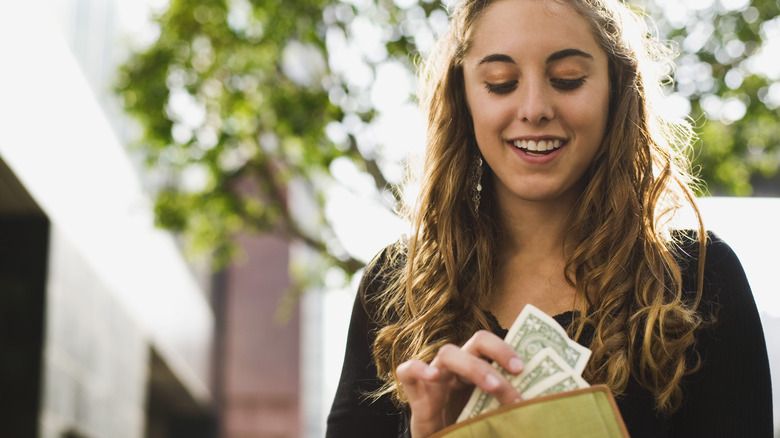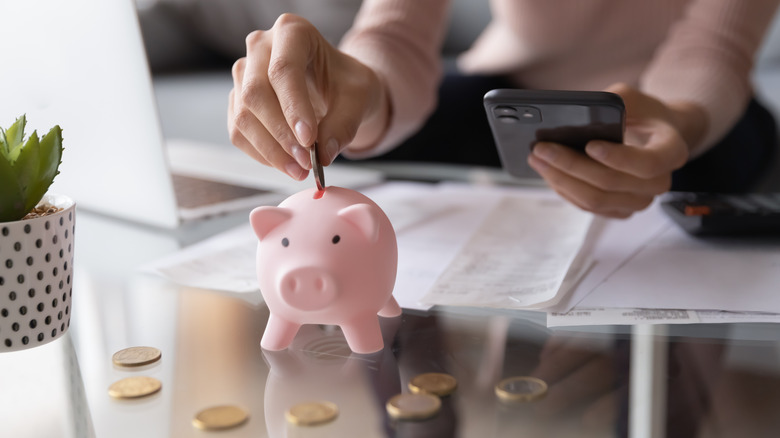Save Money With Low Effort Using The Cash Method
Do you find yourself overspending every time you go to the mall? Or have a hard time figuring out where your money is going? You're not alone. According to Bloomberg, about 13% of U.S. consumers spent beyond their means over the past six months. What's more, approximately 15% have no savings, and another 22% managed to save less than $1,000. In this case, we can mostly blame inflation, but many people overspend for all sorts of reasons that don't make sense.
For example, a LendingTree survey reports that 40% of Americans are spending more than they can afford just because they want to impress others. Given this aspect, it's no surprise that 27% of those who do so are currently in debt. And if that wasn't bad enough, the Covid-19 crisis has altered our impulse buying habits, too. Many consumers turned to shopping as a way to cope with the stress of the pandemic — and they spent big.
But unless you're overspending due to health problems or for other justified reasons, you can and should change your habits. For starters, consider using the cash method to cut back on unnecessary expenses.
Paying with cash can help you save
We're heading toward a cashless society, and the numbers reflect that. In a recent survey by the Pew Research Center, 41% of Americans said they don't use cash for their day-to-day purchases. Moreover, about 42% admitted they rarely have cash at hand. While there's no denying that credit cards make our lives easier, paying by card can lead to overspending and debt. Sure, you could use debit cards, but you still risk spending more than you planned.
One way to address these issues is to pay cash more often. By doing so, you'll only spend what you have and avoid credit card fees. Over time, this habit can make it easier to manage your finances and stop impulse buying. If, say, you leave home with $100 in cash and see a nice dress that costs only $60, you'll still think twice before buying it. You could get the dress, but you'd only have $40 left for groceries, coffee, or whatever else is on your list.
Paying cash could also lead to unexpected savings. For example, you may be able to get a better deal on home repair services, street food, or produce at the farmers' market. Carry cash with you at flea markets, too, as it could give you more bargaining power. Most importantly, switching to cash allows you to budget smarter. And who knows — a few months from now, you might finally be able to tackle your credit card debt.
Should you switch to a cash-only budget?
Using cash rather than credit cards may also lead to greater satisfaction, suggests a 2015 study published in the Journal of Consumer Research. As experts note, people who pay by cash or check feel more attached to the goods they buy. The thing is, cash feels more "real" than a debit or credit card, and being able to pay with cash may give you a sense of gratitude. With this approach, you have full control over your money.
However, no one says you should live only on cash. That would be unrealistic, given that many stores and service providers don't even take cash anymore. Instead, try to allocate a cash-only budget for specific purchases, such as clothes, shoes, groceries, and home decorations. For example, if you plan to go clothing shopping with a friend, leave your credit cards at home and carry only as much money as you need. Think about what you want to buy, estimate the costs, and set a maximum budget.
Personal finance expert Dave Ramsey recommends setting a budget at the beginning of each month, withdrawing the money from your bank account, and then putting the cash in envelopes. You'll use one envelope for groceries, one for dining out, one for entertainment, and so on. That means you can't use the "grocery" envelope to pay for a new dress or other random items. It's a simple, effective way to keep yourself accountable and stick to your budget.

